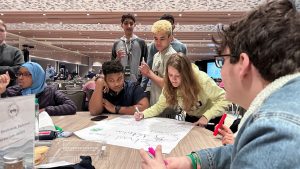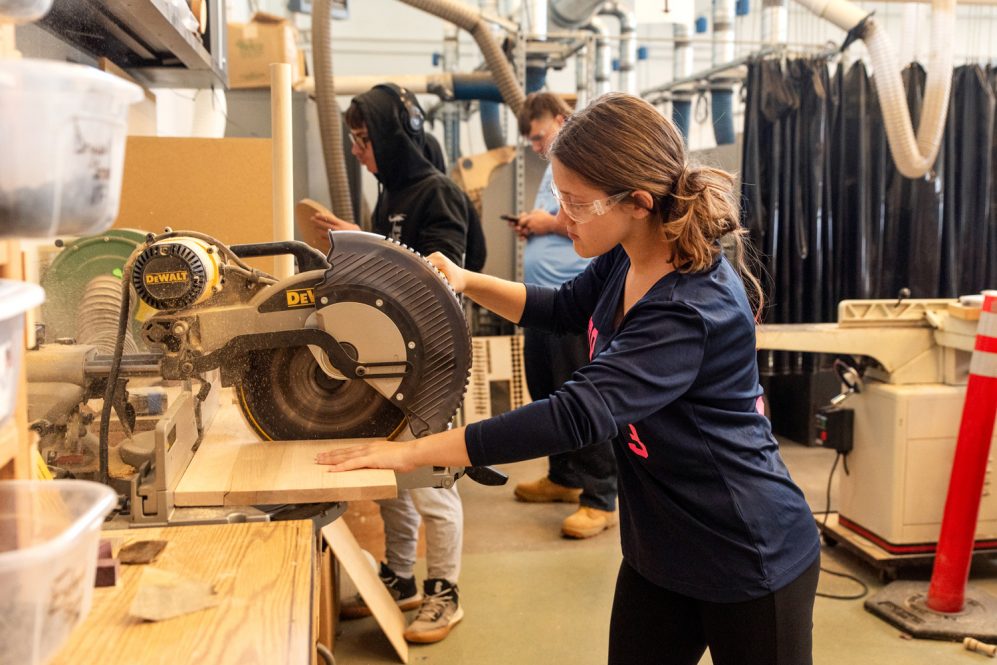A decision to join an agriculture and biotechnology program offered by UConn 4-H became a catalyst for Zuzanna Rogowski, opening the door to new opportunities and potential careers. It all started when the Middletown High School junior learned about the 4-H program through her high school’s agriscience program.
“I was convinced that I wanted to go into biotech and medical school,” Rogowski says. “When I found out about the 4-H agricultural biotech program, I thought it was a good way to determine if it would be a good career for me.”
Now, she says she feels she has more options and is also considering teaching the biotech class for a high school agriscience program. “I didn’t know that I could teach biotech in an agriscience program, the UConn 4-H biotechnology program opened up more careers and opportunities for me.”
Advancing 4-H Youth Careers in Food and Agriculture via Biotechnology and STEM is a program that UConn Extension started offering in fall 2022. Jen Cushman, associate extension educator and state 4-H program leader, created the new initiative with team members from UConn and New Mexico State University.
“The program helps youth build knowledge and career awareness as they learn about how biotechnology supports crops through climate resilience, CRISPR technology, and basic lab techniques,” says Cushman. “Youth members discuss and learn about the evolving field of agricultural biotechnology and what scientists worldwide are studying.”
The program is built on the 4-H fundamentals of belonging, mastery, independence, and generosity.
“I’ve learned about the opportunities I have and what I can do in the future,” Rogowski says. “We spoke to UConn professors and met students. The connections the club has to the different workforce areas are my favorite part. The presentations from professionals showed how many options there are.”
Rogowski completed CRISPR and gene mutation research, which aligned with her interest of bringing extinct animals back. She presented her ideas to the teams from New Mexico State University and UConn in March 2023 and continues her program involvement.
Opening Doors with 4-H
Amanda Thomson is a UConn 4-H volunteer in Middlesex County and an agriscience teacher at Middletown High School. She encouraged Rogowski to join the local 4-H club during her sophomore year in addition to the 4-H agriculture and biotechnology program.
“The UConn 4-H program has provided many wonderful leadership and experiential learning opportunities for our members; it helps connect our members to real-world experiences, to one another, and to adult role models. Several of our members have discovered their career pathways by participating in the 4-H program,” Thomson says.
Rogowski first joined the club and became the assistant coordinator for the Home Arts department at the Middlesex-New Haven 4-H Fair.
“I was covering for someone at my first Fairboard meeting and didn’t know what to do. Kate Yale, a UConn 4-H volunteer, told me it would all be fine, 4-H isn’t a place that judges you, she made me really comfortable. 4-H is more fun than fear, I was scared to present the committee report at first, but quickly became comfortable doing it and the fear fell away and it became fun.”

Rogowski also received a scholarship from the 4-H biotechnology and agriculture program to attend Ignite by 4-H, a national conference in Washington D.C. in March of 2023. Youth apply for the trip, are interviewed, and selections are made. The inclusive teen event offers workshops and programs, and gives youth the opportunity to learn, connect, and share their ideas.
“It was the opportunity of a lifetime and showed me that my career path is one I will enjoy,” Rogowski reflects. “It also showed me that no matter where you are from, a job isn’t about money or credit, it’s about helping people in the future while helping myself. Ignite was cool because I met so many people and was introduced to perspectives other than my own. There were youth there from Alaska, Puerto Rico, and other places. It was a reality check that not everyone lives the way you do.”
In April, she attended UConn 4-H Citizenship Day at the Capitol in Hartford and experienced different government processes and met other 4-H youth from around the state. Two encouraged her to apply for the UConn 4-H Teen Council, and in November, she began her service with the group.
“Through 4-H I have seen Zuzanna grow as a leader and advocate. She has developed her knowledge of STEM-related activities and careers, demonstrated confidence as a public speaker, and discover how to work effectively as a team member,” Thomson continues. “Being selected as a state delegate to attend the Ignite conference in Washington, D.C. was a literal game changer; as its name implies, that experience truly ‘lit a fire’ in Zuzanna that has spilled over to all other aspects of her life as a student, athlete, and leader. I am excited to see where 4-H leads her next.”
Rogowski wants to become a state FFA officer, apply to UConn where she plants to major in agriscience education, and become a UConn 4-H mentor and volunteer in the future. She also has plans to volunteer internationally after completing her degree.
“My best memory of 4-H is becoming part of the family and having people in 4-H around me,” Rogowski concludes. “There’s something for everyone in UConn 4-H and it’s warm and welcoming. We have mechanics, crafts, archery – your project can be anything you choose it to be. 4-H has a place in your life no matter your age, ethnicity, and what you like to do.”
Advancing 4-H Youth Careers in Food and Agriculture via Biotechnology and STEM is supported by the Food and Agriculture Nonformal Education program, grant 2022-68018-36094 from the USDA National Institute of Food and Agriculture.
Follow UConn CAHNR on social media



